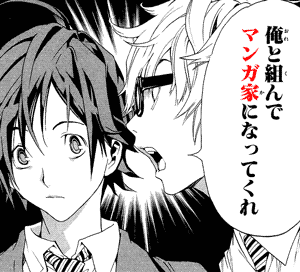Manga: BAKUMAN。 バクマン。 (Chapter 1)
"Manga Artist" in Japanese
There are various ways to say "manga artist" in Japanese.The literal way would be mangaka. But that's only used when you're specifically talking about a person who draws manga comics.
Someone who draws an illustration in manga style for something, or just an illustration is general, is credited as "illustrator, " or irasutoreetaa イラストレーター. Someone who draws animation is an "animator," or animeetaa アニメーター.
A mangaka that draws a manga that's also a doujinshi 同人誌 is also a doujinka 同人家.
Often, the author of a manga is credited simply as "author," sakka 作家.
An author, writer or artist, is also called by the honorific title of sensei 先生.
In the case of adaptations, the author of the original work being adapted is normally credited with gensaku 原作, "original work." For example:
- gensaku: ONE
原作:ONE
Original work: ONE.- The anime Mob Psycho 100 credits ONE as original work, because ONE is the author of the manga Mob Psycho 100.
- ONE also drew the original webcomic of One Punch Man.
- Which Murata re-illustrated as a manga.
- So in the One Punch Man manga drawn by Murata, ONE is credited with the "original work."
- The anime adaptation of One Punch Man is based on the designs of the manga by Murata, so Murata is credited for the manga the anime is based on, while ONE is credited for the original work the anime is also based on.
This gensaku word also applies for writers. If a manga is based on a light novel, the one credited with gensaku is the light novel writer. If there is no light novel but two people are working together, one writing the story, one drawing them, the writer is credited with he gensaku, since the artist is adapting the script as a manga.
Manga: BAKUMAN。 バクマン。 (Chapter 1)
- bo, boku ga
e wo kaite
koitsu ga gensaku
ぼ 僕が 絵を描いて こいつが原作
I, I'll draw the drawings and [he] will [write] the original work.
Kanji
The kanji of mangaka and the respective meanings of the kanji are:- 漫
Unrestrained.
(like laughter, so...)
Comical. - 画
Picture. - 家
House.
The first two form the word manga 漫画, which is one of the ways to say "manga" in Japanese.
The last kanji can be read in various ways. For example:
- ie 家
House. - ka-zoku 家族
Family.
But in the case of this word it's the -ka ~家 suffix, which refers to someone whose craft is something, in this case, their craft is drawing "manga," so they are a manga artist.
マンガ家
Sometimes, mangaka is partially written with katakana, as mangaka マンガ家 instead.The kanji of manga 漫画 are jouyou kanji 常用漢字 taught in chuugakkou 中学校, that is, they're common characters taught in junior high, so the reason for spelling it with katakana is not because they're difficult kanji, but, instead, because manga 漫画 takes 22 strokes to write while manga マンガ takes just 8.
Manga: BAKUMAN。 バクマン。 (Chapter 1)
- ore to kunde
mangaka ni natte kure
俺と組んでマンガ家になってくれ
Please join me and become a manga artist.- ore to kumu 俺と組む
To partner with me. To join me.
- ore to kumu 俺と組む
What -Ka ~家 Means?
The -ka ~家 at the end of mangaka 漫画家 is a suffix that normally refers to a craft, and people who do that craft. In the case of mangaka, the craft is manga. They're manga-craftsmen, that is, manga authors, manga artists.A similar word would be doujinka 同人家, which is someone whose craft is publishing doujinshi 同人誌. Other similar words are:
- shousetsu-ka 小説家
Novelist. Story writer. Light novel writer.- shousetsu 小説
Story.
- shousetsu 小説
- geijutsu-ka 芸術家
Artist. (in the sense of making...)- geijutsu 芸術
Art.
- geijutsu 芸術
- sakka 作家
Author.- saku 作
Work. (of art, etc.) - It's sakka instead of saku-ka because of a change of pronunciation called sokuonbin 促音便
- saku 作
- ongakuka 音楽家
Musician.- ongaku 音楽
Music.
- ongaku 音楽
- shashinka 写真家
Photographer.- shashin 写真
Photo.
- shashin 写真
- hatsumeika 発明家
Inventor.- hatsumei 発明
Invention.
- hatsumei 発明
- hyouronka 評論家
Critic.- hyouron 評論
Critique.
- hyouron 評論
- seijika 政治家
Politician.- seiji 政治
Politics.
- seiji 政治
Note that there are some exceptions.
For example, not all words for occupations end in -ka ~家.
- irasutoreetaa イラストレーター
Illustrator. (katakanization.) - animeetaa アニメーター
Animator. - odoriko 踊り子
Dancer. (usually girls, e.g. a belly dancer.)
Also, -ka ~家 can be a suffix for words that are not exactly occupations. For example:
- senmonka 専門家
Specialist.- senmon 専門
Specialty.
- senmon 専門


No comments: